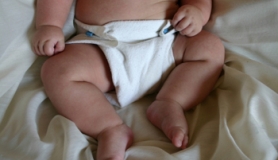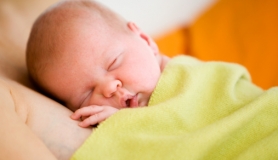We are told as soon as they are born to put our babies down and ‘you are making a rod for your back’ (I have been told this many times). Yet as adults, most of us like a cuddle. We are biologically programmed to want close contact with our primary caregiver/s. They keep us safe. Our survival instincts depend on it. A young baby in the caveman days left in a room separate from mum, would be crying and at risk of being eaten by predators. Our babies do not know that mum is next door. They just feel scared and alone because they have no idea of any of this yet.
Humans are one of the most dependent mammals. Dependence fosters independence. Make those rods for your own backs because your children will thank you for it when they feel safe and secure and loved so they are able to take those steps away from you with confidence and knowing they will always have those loving, supportive arms to fall back on. These are positive messages we are instilling in our children that they will carry into adulthood.
Danger of ‘crying it out’
We are told to try the cry it out method. Yet as adults, if we are sad, we have the choice to go to a friend or family member for comfort, to be cuddled, to be listened to, to be reassured. But our babies are told to cry alone in their cots. As adults, if we cannot sleep then we can get up and make ourselves a herbal tea or read a book or listen to music until we feel ready to sleep again. It is perfectly okay for us as adults to not be able to sleep, as I am sure we can all relate to nights where you are wide awake and struggling to sleep.
Throw in children’s big emotions and those feelings of being scared of the dark or even being woken by a scary dream. Imagine how you would feel if you could not walk but you were shut in a room to cry yourself to sleep? Why is the system so hell bent on encouraging the crying it out method? We wonder why we have anxious children and adults more than ever before yet it is the norm to leave a child, who is dependent on us for survival, to cry on their own.
We are teaching them from the off set that if they are upset, their emotional needs will not be met. I have had many health professionals say to me, do not worry if they cry so much they are sick, that’s normal. How did that sort of barbaric sentence become common practise to be encouraged by our health professionals? Or parents who shout at their children because they cannot sleep? I am wide awake from 2am to 3am every night. I do not have anyone shouting at me because of it. That will not help me sleep either. Why should our children?
We are told co-sleeping is very bad. Yet as an adult, we like to sleep next to our partners. How did our ancestors sleep? With their babies. There were not any cots then. If a baby needs to be close to you to feel safe and sleep then they should have that right. If a baby loves their cot then great, but many do not. Let them make the choice and meet their needs in the same way we do for ourselves as adults.
We are told children are bad or naughty if they have tantrums. When a child is upset, logic does not work until us as parents respond to their brain’s emotional need. When emotions overwhelm a young child, their brain is not able to maintain rational control. Their physiology helps restore equilibrium by having a meltdown to release their feelings and frustrations.
Tantrums are an opportunity for us to connect and deepen our child’s trust. Not to be punished. Punishments teach our children that they do not have the right to experience big emotions. Even though many adults cannot control their emotions, we expect young children with developing brains to be able to.
“Tantrums are an opportunity for us to connect and deepen our child's trust. ”
We are told that we need to be strict and shouting at children is acceptable. Yet as adults, being shouted at can make us feel upset or angry. The child who is shouted at by the teaching assistant or teacher the minute they walk through the classroom door for being upset about coming to school and making a ‘silly noise’ when crying, is not going to want to come into school when treated like that (and yes, this has happened at my son’s school). It defeats the object.
Shouting doesn’t work
If we make a mistake and someone screams at us, we learn to be scared and experience fear and prolonged shouting often causes anxiety or rebellion depending on personality types/experiences. Shouting all the time does not work. Kids get upset. Kids that experience shouting all the time switch off. But the impact it does have is the resentment they feel for you treating and making them feel like that. I am not saying no parent will ever not lose their cool; of course they will! No one is perfect. But it is important that when we do, we can model how to apologise and explain our actions to set a positive example.
What message does shouting frequently achieve?
That our children are not respected enough to be spoken to nicely. When our children are adults and they experience an event where they need help or made a mistake, we want them to feel like they will be supported and not scared of a negative reaction.
For example, your 20 year old crashes his car because he was texting (no one is hurt but the car needs a lot of work). Will he go to the shouting version of you who will scream about how stupid he is and make him feel worse than he already does? Or will he go the version of you who can be honest enough to say you have made a mistake in a calm manner but work together on a solution. The version of you that you yourself needed as a child growing up. The one who says it is all going to be okay, we will sort this together, we always do. A week from now this will be smaller, a month from now smaller still and a year from now we might be able to laugh about this. The parent who tells you a lump of metal can be replaced but you cannot be and I am so glad you are okay and safe. The one who decides what garage to get the car repairs done. The one who tells your son to go to the physiotherapist to get his neck checked. Be the parent you needed as a child growing up and your children will thank you for it, but so will that version of yourself that did not have anyone being your voice in your childhood.
Research the concept of just culture and apply it to day to day life; maybe we would have less anxious adults if this was applied to everyone’s life experiences.
We are told children must have a balanced diet and eat all their dinner. We praise the children that do and punish the ones that do not with shaming comments or demoralising comparisons to other children or punishments/consequences (“no dessert for you”). Yet adults have a huge choice on what we want to cook for dinner or order in a restaurant and some days we will not be hungry at 5pm but other days we will ravenous or some days we just do not feel like eating much because we are unwell or stressed or have a lot going on.
Yet children are expected to eat all of the dinner they are given, which most of the time they did not get to choose, often at the same time each day.
We expect young children to be without their comforts. Yet as adults we have many. Society frowns upon the four year with a dummy or the two year still enjoying drinking breast milk or the 7 year old who still cannot be without their teddy. But an adult has a glass of wine after a long day, or chocolate or crisps to comfort eat or a warm blanket in front of the tv or a relaxing bath and many more depending on personal preference.
Whereas children do not have the scope to have this broad choice of relaxation and comfort and they refer to what they have always known for comfort - a dummy, a bottle, a mummy cuddle, a blanky, a teddy etc.
Some will say that all of the above is making children spoilt. I argue that is simply equipping children with the same rights we have as adults. To feel respected, heard and have the right to make a choice about the things that make us feel happy and safe.
Let’s change the narrative that society is so set on enforcing upon us. Let’s empower our children. Let’s start to question what is fair and right.
It is so simple - if you would not treat an adult like it, then do not treat a child like it. Let us be our children’s voices, comforts and advocates.
Let’s change the narrative…
Kirsty is a mum of two boys (aged 1 and 5) “I live in Essex. I am a qualified primary school teacher with an early years specialism and I feel incredibly passionately about children’s voices and rights being heard, valued and respected. I feel this is how we can make the world a better and happier place where children can grow into adults who are able to regulate their emotions effectively with resilience, compassion and confidence.”







